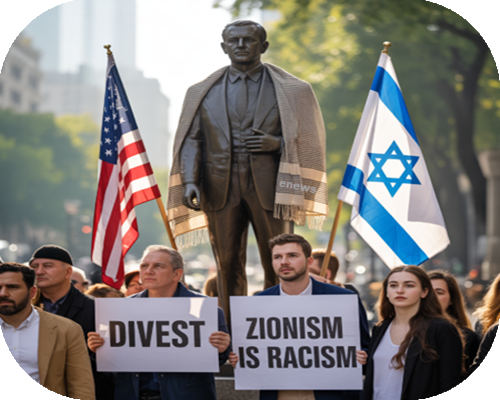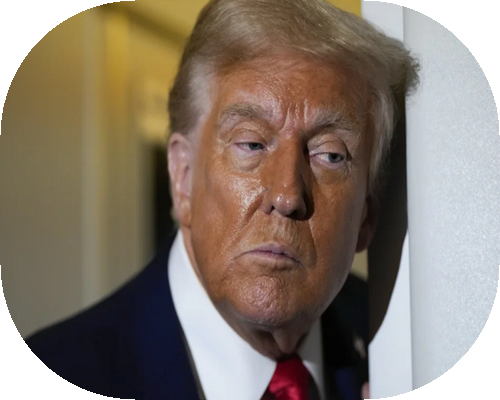In late June, a federal judge issued an injunction against President Trump’s attempt to prevent international students from obtaining visas to study at Harvard University. The president’s threat followed a period of heated conflict with the institution, in which he had issued a series of demands and warnings, all supposedly relating to his efforts to crack down on campus antisemitism.
That multiple judges have refused to further these policies may, at first, worry those concerned about antisemitism. On closer inspection, however, bending to Trump’s demands could itself be harmful to the Jewish community.
The current showdown began when Harvard rejected the demands of a letter sent by the multi-agency Task Force to Combat Antisemitism. These demands involved significant reforms to leadership, admissions and discipline, including immediately shuttering all diversity, equity and inclusion initiatives.
The letter was issued in light of the findings of an investigation into reports of antisemitism at Harvard. It found that Jewish and Israeli students had been ostracized, academic settings had become politicized and antisemitism had been normalized across the institution.
While recognizing the severity of this environment, Harvard officials argued that measures were already being taken to reduce antisemitism. Furthermore, they argued that these requests interfered with the university’s crucial work, including lifesaving medical research.
Trump aimed to restrict visas for new international students at Harvard whose entry does not align with “the national interest.” It remains unclear what it means for a student’s entry to be permissible based on national interest, creating a subjective political litmus test system for prospective international students.
Rabbi Jason Rubenstein, the executive director of Harvard Hillel, has questioned this action, arguing the president’s threat was “neither focused nor measured” and risks “substantially harming the very Jewish students and scholars it purports to protect,” including Jewish and Israeli international students.
This concern draws on a broader issue; international students are being held collectively responsible for institutional failings at their chosen universities before they have even set foot there.
Not only is this unfair for international students and the university communities they benefit, but this tactic also presents a distorted image of antisemitism. In correlating antisemitism among young people with student immigration, Trump appears to present antisemitism as a largely imported ideology.
The evidence supporting this is limited. A 2018 United Kingdom study found no statistically significant causal relationship between immigration from the Middle East and North Africa countries and rising antisemitism in Western Europe. A German study similarly concluded that the rate of immigration was not a “key determining factor” in rising antisemitism.
This is further clarified by recent studies that highlight the extent to which antisemitic and anti-Israel attitudes run rampant among college-age American citizens. Data from Pew Research Center show that only 46 percent of Americans age 18-29 have a favorable view of Israelis, a fall of 17 percentage points since 2019. Another poll last year found that millennials and Gen Z were the most likely Americans to endorse anti-Jewish tropes.
This data illustrates that the trend of radicalization against Jews and Israelis is far from limited to the foreign or immigrant context.
This is something that is frequently elucidated in the modern campus context, in which ringleaders tend to be keffiyeh-clad wealthy White students and self-proclaimed socialists who have adopted anti-Israel mantras as part of a bundle of miscellaneous, vaguely “leftist” ideologies.
In attempting to relegate antisemitism to an imported issue, Trump neglects its domestic sources, denying the long and complex history of homegrown antisemitism.
American antisemitism predates recent immigration trends, and historically has existed predominantly on the far right. Studies within the last three years have found the epicenter of American antisemitism to be young adults on the far right.
Since October 7, anti-Israel demonstrations nationwide have been hijacked by neo-Nazis and far-right radicals.
Radical groups have also used social media to target younger demographics. Recent years have seen further anonymity protections and a growth in bots that inundate posts with antisemitic comments. This radicalization would not be affected by immigration crackdowns, highlighting the need for more effective regulatory legislation.
In aligning antisemitism with immigration, the Trump administration downplays and dismisses the significant domestic causes of antisemitism from both ends of the political spectrum. In doing this, he can conveniently evade all responsibility for its rise, among his citizens and within his party. Instead, antisemitism is attributed entirely to Trump’s opponents and to those he seeks to remove from the country, allowing him to champion his America First policies as the primary means for its eradication.
The clampdown on student visas is an America First policy first discussed in Trump’s 2016 campaign, when it made no mention of antisemitism. The policy has now been repackaged as one necessary for Jewish safety to make it more palatable.
One of the most worrying risks this poses is making Jews appear culpable for their adverse effects. As Trump pushes nationalist policies under the pretense of prioritizing Jewish student safety, he politicizes the fight against antisemitism and furthers the dangerous misconception that the right to safety on campuses is part of a polarizing or controversial agenda.
If the Trump administration aims to reduce campus antisemitism, targeting international students is not an effective means to that end.
The initial letter to Harvard contained several recommendations alongside worthy disciplinary and investigative measures. Their coupling with radical other measures serves only to fuel conflict and politicize an issue that should not be controversial.
Trump must set aside personal disputes and narrow his scope to recognize antisemitism in all its forms, prioritize Jewish students over petty squabbles, and decouple the well-being of Jewish students from unconnected political endeavors.
How useful was this article ?
Click on a star to rate it!
Average rating 2.3 / 5. Vote count: 3
No votes so far! Be the first to rate this post.
We are sorry that this post was not too useful for you!
Let us improve this post!
Tell us how we can improve this post?















